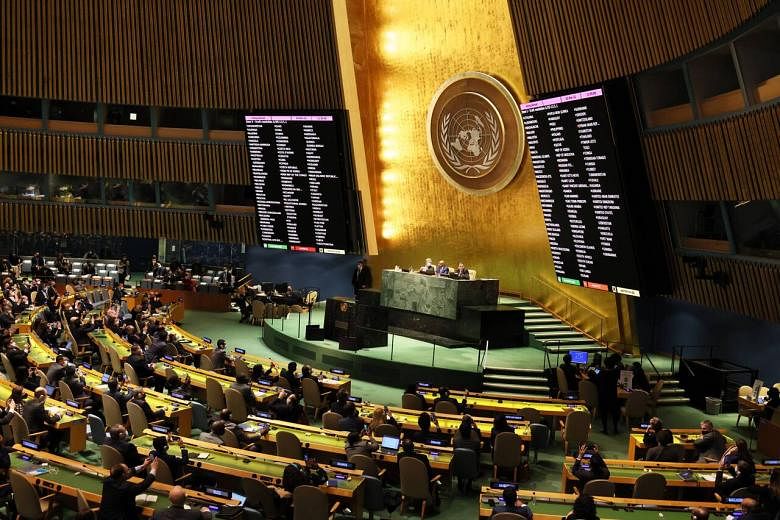SINGAPORE - The ongoing Russian invasion of Ukraine serves as a stark reminder of how vulnerable small states are when confronted by a larger and more powerful opponent, said Foreign Minister Vivian Balakrishnan.
In this charged geopolitical landscape, it is ever more vital that such small states continue to stand up for a stronger United Nations (UN) as well as a robust multilateral system that levels the playing field and takes all countries' interests into account, he added.
Speaking on Thursday (March 3) during the debate on his ministry's budget, he told Parliament that Singapore has spared no effort in playing its part to strengthen the rules-based multilateral order that provides the country with a platform to safeguard its interests.
"That's why we worked with a cross-regional group of countries to establish the Forum of Small States, which in fact celebrates its 30th anniversary this year," said Dr Balakrishnan.
He reiterated that Singapore does not take sides but will take a stand to uphold existential principles. Singapore was one of 141 countries that on Wednesday voted at the UN General Assembly to demand that Russia withdraw its military forces from an embattled Ukraine, where days of fighting have killed thousands and prompted hundreds of thousands to flee.
With the fortunes of all countries and all peoples now increasingly interdependent, the likes of Singapore value a system where sovereign states - regardless of size - have equal rights; are not subject to the rules of the jungle where might is right; and are not forced to make invidious choices between big powers, said Dr Balakrishnan.
"Multilateralism and economic integration have been a formula for peace and prosperity for many decades, since the end of the last World War," he added. "You notice I said 'last World War' - I'm betraying my anxieties."
He noted that the rise of protectionism amid Covid-19 had also underscored the importance of a free, open and rules-based multilateral trading system as embodied by the World Trade Organisation; multilateral fora such as the Asia-Pacific Economic Cooperation and Group of 20; and regional arrangements such as the Comprehensive and Progressive Agreement for Trans-Pacific Partnership and Regional Comprehensive Economic Partnership.
"Even in Singapore, as we face pushback from some people against economic integration, it is important to redouble and reaffirm that this is an essential pillar for our economic strategy," said Dr Balakrishnan.
In the case of intensifying distrust and rivalry between the United States and China, while trade and economic issues can be negotiated, "disagreements cast in moralistic or ideological terms - on issues such as human rights or political systems - quickly lead to deadlocks where no compromise is possible", he noted.
"We hope both countries will accept that there is a need to reset their postures, to work out a new modus vivendi and to reduce zero-sum competition," he said, pointing out that US-China relations would also determine the trajectories of the rest of the world.
"We therefore welcome efforts by both the US and China to engage at the highest levels; to cooperate on global challenges like climate change and the digital age," Dr Balakrishnan added, urging greater people-to-people engagement as travel restrictions are removed.
"We hope that these interactions will encourage greater trust and pave the way forward for a constructive relationship," he said.
Singapore enjoys excellent ties and high levels of trust with both countries, with several prominent interactions, visits and engagements both ways even amid the pandemic, said Dr Balakrishnan, citing how he had met or spoken to his Chinese counterpart Wang Yi on nine occasions in the past two years.
Closer to home, he also noted the strengthening of relations with neighbouring Malaysia, with the safe movement of goods, services and people continuing throughout the Covid-19 pandemic.
"Most important, at times of greatest need, we've been available to each other, and one thing which I want to cite is that we made sure our supply chains both ways never failed," said Dr Balakrishnan.
With Indonesia, a Leaders' Retreat held in January was a significant milestone with landmark agreements signed to address longstanding bilateral issues.
"The key point is this - that we can steadily resolve old issues and we can open up new areas with win-win outcomes," said Dr Balakrishnan.
He acknowledged, however, that the situation in Myanmar - a year after the army seized power from the democratically elected government - remains "dire".
"Unfortunately there has been no significant progress at all," said Dr Balakrishnan. "We will continue to work with the Asean chair - it's Cambodia this year - as we did with Brunei last year and indeed with our fellow Asean members to continue trying to promote, persuade, cajole and reach a peaceful and durable resolution of the situation in Myanmar."
Second Minister for Foreign Affairs Maliki Osman also updated the House on Singapore's relations with Asean, Malaysia, Indonesia and the Middle East, while Senior Minister of State for Foreign Affairs Sim Ann provided details regarding China, the US and other key partners.


